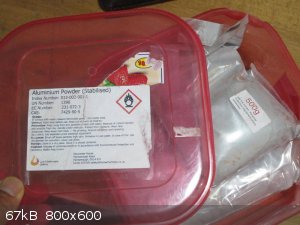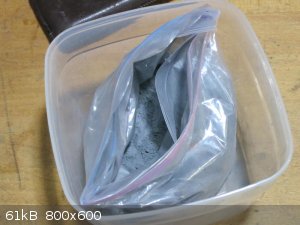metalresearcher
National Hazard
   
Posts: 731
Registered: 7-9-2010
Member Is Offline
Mood: Reactive
|
|
Different Al grades for Thermite ?
After some time I experimented again with Thermite.
I have two batches of Aluminum powder, a dark gray one and another one nearly white and is called 'Stabilized'.
The first one does react, but somewhat lousy. This video shows burning 21g of Thermite made from the dark gray Al powder + Fe2O3 and I hoped it would burn through the bottom of the can but it
didn't a rather lousy reaction.
But when using the 'stabilized' white one it does not ignite at all, even when using MnO2 instead of Fe2O3. I normally use KClO3 + sugar as igniter
but that did not work. Mg ribbon neither and KMnO4 + glycerin neither.
Then I made a mixture of the 'white stabilized' powder and Fe2O3 again with a little bit of the gray Al powder in it, sprinkled a little bit of the
unmixed gray Al powder over the thermite heap, put KClO3 + sugar on it, lighted it and it reacted far more vigorously.
See This video .
It seems that the gray Al powder reacts lousy in itself but 'triggers' the white powder to react.
Why ?
[Edited on 2014-8-10 by metalresearcher]
|
|
|
Bert
|
Thread Moved
10-8-2014 at 12:04 |
careysub
International Hazard
    
Posts: 1339
Registered: 4-8-2014
Location: Coastal Sage Scrub Biome
Member Is Offline
Mood: Lowest quantum state
|
|
Quote: Originally posted by metalresearcher  | After some time I experimented again with Thermite.
I have two batches of Aluminum powder, a dark gray one and another one nearly white and is called 'Stabilized'.
The first one does react, but somewhat lousy. This video shows burning 21g of Thermite made from the dark gray Al powder + Fe2O3 and I hoped it would burn through the bottom of the can but it
didn't a rather lousy reaction.
But when using the 'stabilized' white one it does not ignite at all, even when using MnO2 instead of Fe2O3. I normally use KClO3 + sugar as igniter
but that did not work. Mg ribbon neither and KMnO4 + glycerin neither.
Then I made a mixture of the 'white stabilized' powder and Fe2O3 again with a little bit of the gray Al powder in it, sprinkled a little bit of the
unmixed gray Al powder over the thermite heap, put KClO3 + sugar on it, lighted it and it reacted far more vigorously.
See This video .
It seems that the gray Al powder reacts lousy in itself but 'triggers' the white powder to react.
Why ?
[Edited on 2014-8-10 by metalresearcher] |
Your white stabilized aluminum is probably intended for paint use, and had a coating on it to make it non-reactive (paints can have an alkaline
component that reacts with aluminum). I would guess that this makes it hard to ignite,although it is surprising to me that it is as hard to ignite as
you say (I would have thought that the magnesium would do it, surely).
My guess is that the gray powder, which is uncoated, and ignites easily even if it burns poorly, acts as a proper ignition mixture to get the reaction
going. I don't know why the gray powder burns poorly, can you tell us something about its history?
|
|
|
metalresearcher
National Hazard
   
Posts: 731
Registered: 7-9-2010
Member Is Offline
Mood: Reactive
|
|
Here the two bags of Al.
The first photo is the 'white one' got via eBay from a UK supplier, the other one a few years ago via another eBay supplier.
 
|
|
|
Manifest
Script Kiddie Asshole
  
Posts: 229
Registered: 7-12-2012
Member Is Offline
Mood: No Mood
|
|
I agree, I believe the white one is coated with wax for use in paint.
|
|
|
blogfast25
International Hazard
    
Posts: 10562
Registered: 3-2-2008
Location: Neverland
Member Is Offline
Mood: No Mood
|
|
For one, it's a rather poor comparison you're making there: different quantities, different 'crucibles'. But it would appear that the second test
burnt more vigorously than the second one.
Whether or not a thermite mixture will destroy something depends enormously on the amount of charge, as this determines the total enthalpy the reacted
mixture contains.
|
|
|
metalresearcher
National Hazard
   
Posts: 731
Registered: 7-9-2010
Member Is Offline
Mood: Reactive
|
|
Quote: Originally posted by blogfast25  | For one, it's a rather poor comparison you're making there: different quantities, different 'crucibles'. But it would appear that the second test
burnt more vigorously than the second one.
|
OK, here it is, same quantity, same steel can.
The test with the gray thermite 3 weeks ago (also linked to in the first post):
http://www.metallab.net/jwplayer/video.php?f=/clips/Thermite...
And a test just made today with the white Al powder (after some explanation the actual run starts at 01:07):
http://www.metallab.net/jwplayer/video.php?f=/clips/Thermite...
[Edited on 2014-8-11 by metalresearcher]
|
|
|
blogfast25
International Hazard
    
Posts: 10562
Registered: 3-2-2008
Location: Neverland
Member Is Offline
Mood: No Mood
|
|
So the second one burns a bit better. Note that 21 g is a very, very small charge, so don't expect that to burn through anything more than thin sheet
metal.
To maximise the impact of the reaction I use much smaller, slightly V-shaped crucibles, tall rather than squat. Tea cups or egg cups (from a pound
shop) are ideal for this. The shape forces the entire melt to collect at the lowest point of the crucible.
|
|
|